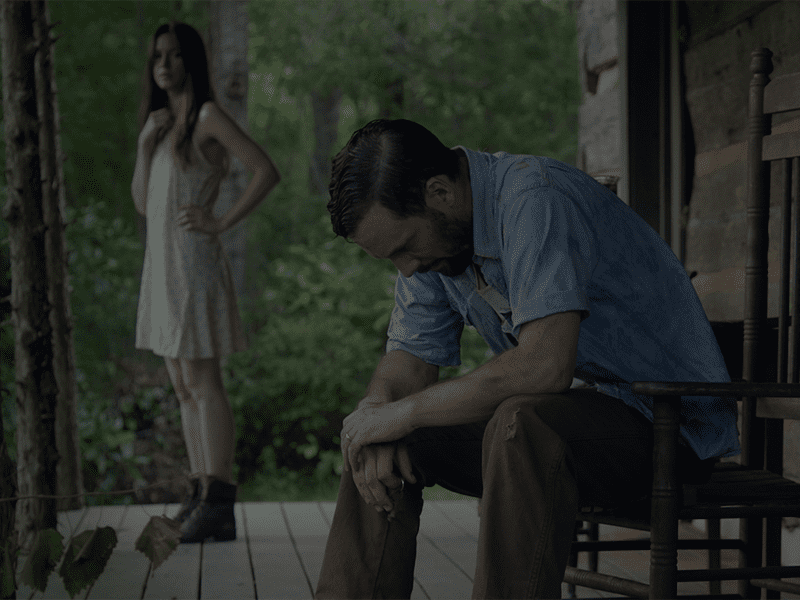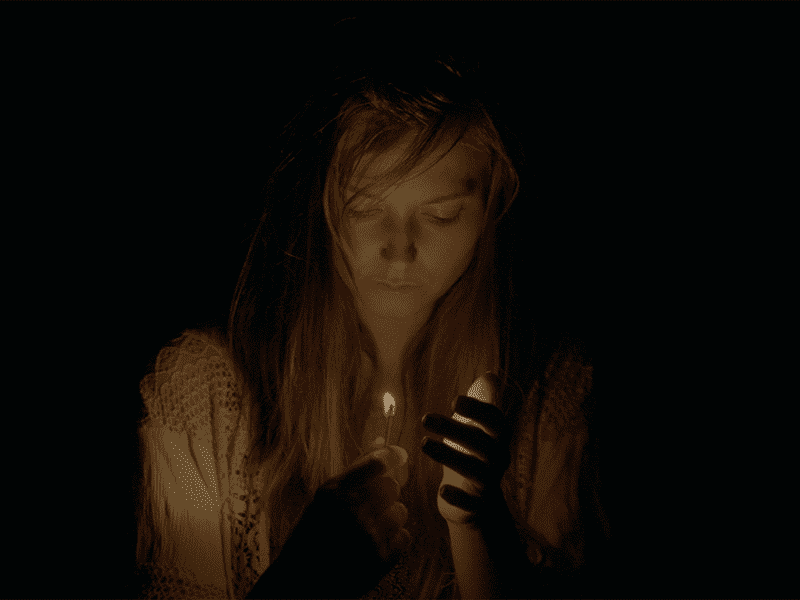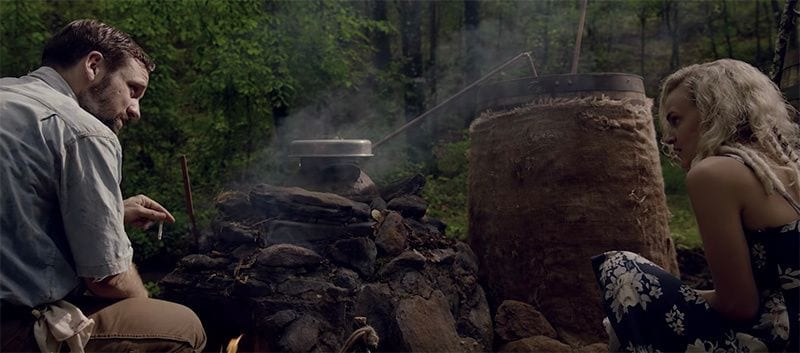
“I was very much wrestling with the question of time and our modern or not so modern definitions of relationships, love and monogamy, and even sexuality a bit” explains director Takashi Doscher of his narrative feature debut Still (2018).
When hiker Lily (Madeline Brewer) loses her way on the Appalachian Trail, she stumbles onto an isolated farm and encounters a seemingly odd couple. While Ella (Lydia Wilson) is happy to take her in, Adam (Nick Blood) is initially less hospitable, and as Lily’s stay extends, she begins to learn that the pair are protecting a secret buried deep within the mountains.
With numerous narrative short credits, in 2010 Doscher co-directed the feature documentary A Fighting Chance, the story of 23-year-old Kyle Maynard who, born without arms or legs, looks to find an able-bodied fighter for a Mixed Martial Arts match.
In conversation with PopMatters, Doscher discusses the appeal of the cinematic medium and filmic storytelling as a process of death and loss. He also reflects on the uncertainty of fulfilling his intentions for Still, and the desire to place the audience as authors of their experience, or relationship with the characters.
Why film as a means of creative expression? Was there an inspirational or defining moment?
The defining moment was probably watching Jurassic Park (1993) in theatres for the first time. I was quite young when that came out and I was a huge fan of dinosaurs as a child, and I remember having to convince my father to let me see that movie. He was afraid that it might be a bit too scary because I was about five or six years old at the time. I remember being completely captivated by what I saw, these creatures brought to life in a way that I had always imagined, and in a way I couldn’t possibly have imagined. So to see those things realised on screen, there was just a sense of magic and wonder to it that I just haven’t quite experienced in any other medium.
Film merges the different art forms — photography and the framing of the image, the literary through voiceover, and sometimes films can feel staged. How do you compare and contrast film to the other mediums in terms of what makes it unique and what each individual medium contributes to the concept of storytelling?
That’s a big question…. I saw film and filmmaking as one of the most difficult things to do as a medium of storytelling and expression, because as you mention, there are so many different elements involved. Not to take away from any of the other mediums, but film is this amazing amalgamation of them all – you have writing, music and visuals.
I studied physics in college; I didn’t go to film school. So film was this wonderful way of merging my two loves, my love for story, as well as my love for the technical and fascination with technology. Film is strange in that way because it can be very lyrical and whimsical, beautiful and ethereal, both in the story that it tells and in how it expresses that. But it’s also quite technical; you have to understand light, shot angles and composition, so there’s a bit of the marriage of these two things that I find really interesting. Then on top of that, unlike the other mediums of writing or painting, or some of the others, it’s all collaborative, and so the job as a filmmaker is constantly shifting and changing.
I find writing to be quite solitary and even a bit lonely, and sometimes I really appreciate that because I can control precisely the words that I put down on paper. But then that world has to expand and you have to give that screenplay or blueprint to other people and have them contribute to it. From then on it’s all about communication and collaboration; at least that was certainly the story for Still.
The other thing that’s important to mention — because I feel video games and interactive media combine a lot of these different disciplines — there’s something nice about creating a singular experience, and one that can be repeated in the exact same way every single time, that’s consistent and reliable in that way. I think that gives a little more control to the filmmaker, but it also allows you to revisit it, and years down the line experience it in essentially exactly the same way. There aren’t these different paths and choices that video games offer, and so for all those reasons that’s what draws me specifically to film and storytelling in this medium.

An individual film is intriguing because it’s in a permanent form, and yet our experience gives it an impermanence. This is a contradiction that exists at the heart of cinema, especially if we consider the way in which we view something we’re either familiar or unfamiliar with. The power of film is the way in which on any viewing, it’s capable of triggering different thoughts as it engages us.
Of course we don’t experience any film in a vacuum, and so our own life experiences, environments and that moment in time shapes it. I think you put it beautifully how there’s a permanence and impermanence about it, a sort of exciting spontaneity when you are watching a film, or revisiting a film after several years. And again, not to harp on it, but from a filmmaking standpoint there’s always that friction and that balance between controlling what you can control, and embracing what you can’t control. At least for this movie it was very much a constant — I don’t want to say battle, because it wasn’t always adversarial in that way — but there is a bit of embracing what you are given, and embracing the things that you can’t control, while still trying to express yourself the way you wanted to.
There’s a perspective amongst filmmakers that there are three versions of the script: the script that is written, the script that is shot and the script that is edited. Terence Davies, however, remarked to me: “Well it is not so much different versions as it’s three deaths really — the death of the idea when you put it on the page, the death of that idea when you’ve shot it, and the death of that idea when you cut it. But through that death you find the life of the new film and that’s the journey you go on.” Would you agree with Davies that filmmaking is not so much a case of versions, so much as it’s a case of “deaths”?
I definitely agree with the idea of death or loss and the different versions of the film. There’s a process of letting go that has to occur between pre-production, production and post-production. I don’t necessarily see them as three separate stages because there’s so much blending and shifting that’s happening on the edges of those things. At least for me, the edges of those different processes are blurred, and so constantly in the production you are dipping back into pre-production to re-write or adapt. And constantly with post-production you are dipping back into production, and sometimes quite literally with ADR reshoots.
We didn’t have the option for reshoots on Still, but even in just digging through the footage and finding what you have, and particularly in the editing process, I often found — or at least how my brain worked — was that in this script I had created a house of cards. There was the idea that I couldn’t remove any one piece of that or it would damage the structure, or the integrity of everything. There’s a reason why this scene happened here and there’s a reason why this scene existed because of the clues, or the trail that it leaves for the subsequent scenes.
It’s really interesting because sometimes I found my point of view on that to be very relevant, and then sometimes I found it to be completely irrelevant for a viewer. So that’s why I say some of this is quite blurry because even in the post-production process you are obviously re-writing the film, you are constructing it again. So there needs to be a death, a sense of loss of whatever that initial intention was, which may not be possible any longer, or may not be the best version of what that can be.
I don’t see it as three separate phases because there’s so much blurring that has to happen, and it’s also funny to think that the movie doesn’t really exist until you get through post production. Very few people read screenplays and certainly no one outside the industry does it for fun very often. No one watches raw footage, and that you’re treating them as three separate stages is maybe not really very fair because nothing really exists until the film is completed, and has gone through each of those phases.
What was your intent when you first set out to tell this story, and how do themes and ideas generally take shape for you?
It depends on the story. For Still specifically, I was very much wrestling with the question of time and our modern — or not so modern — definitions of relationships, love and monogamy, and even sexuality a bit. I was in the process of proposing to my then girlfriend, now wife, and the concept of pledging yourself to someone for the rest of your life was something that I didn’t take lightly. I couldn’t help but think what would happen to these constructs if instead of living for eighty, ninety or a hundred years, we lived for two hundred, four hundred or six hundred years? How would that change how we approach some of these things? Would it change? Would things evolve or devolve? So it wasn’t necessarily a theme, but it was more of a question that initially got me started for this particular film.
Still is narratively uncomplicated, broken down into three chapters or acts, one of which leans more towards exposition. How do you moderate exposition, so that you’re not just explaining, but creating emotion and therein a story that the audience immerses itself in, without being pulled out of it?
Well I don’t if it’s entirely effective in accomplishing what you just described. I was particularly interested in point of view with this film, where there are only three characters. So I thought introducing the story and placing the audience in the point of view of Madeline Brewer’s character [Lily] was narratively the most interesting place to start — full of mystery with a bit of tension, and having no idea who these people are or what they’re about.
Again, I’m not sure if it’s entirely successful, but I wanted to allow the audience’s opinion of these characters to change. I wanted to do that from their point of view and not from exposition or explaining their past, but from us experiencing it — how they came to be at this place, what their initial relationship was, and how that may have changed and evolved. Therefore, we can put together the pieces of how that changed and evolved before Madeline’s character arrived, and for me that was the intention of playing with point of view, and how it can shape an audiences opinion on a character.
The first chapter, so to speak, is from Lily’s point of view, and then the second chapter, in my opinion, is from Ella’s point of view, showing her assertiveness and independence, and showing her as this spunky person. The third act is from Adam’s point of view, who has to confront and realise what’s happened to his relationship, and to come to terms with the impermanence of that situation that he had assumed was permanent.
One of the prevalent themes of the film is the idea of imprisonment, Still looks to the idea of life itself being a prison, especially immortality or an ongoing mortal existence. Whether this defines it as an optimistic or cynical film I’m uncertain, but any discussion of the film needs to address the theme of imprisonment.
I do feel that each of those characters are wrestling with the concept of imprisonment, in some form or fashion. I think both of our female characters are trying to escape it, only to find themselves in a new situation of confinement. Adam I almost find to be the most romantic character in some way, because he seems to quite enjoy the situation that he’s in. It’s like he sought out a certain stability, he built the walls of the prison himself and then decided to fiercely guard that, without realising those walls also surrounded someone else. And that’s ultimately where the central conflict of the film is derived from: each of the characters’ different outlooks and desires on what is comfort, what is love, what is freedom, what do these things mean, and how each of them value those different things.
Lily is obviously escaping from death quite literally and finds an opportunity that she can continue living, only to realise at the very end of the film that [her choice] is a prison in her own right, or at least that if she’s going to choose that prison, she would rather choose better inmates than the ones she was left with. Ella’s character is quite a tragic, because she’s escaping an abusive relationship, literally seeking liberty, seeking an independence and freedom from those sorts of things, just to find herself trapped in another, if not a physically abusive relationship, then an emotionally abusive one. And yeah, I find Adam to be one of the most romantic of characters in this because he decides that is what he likes. But he doesn’t quite have the emotional maturity to realise it’s slipping through his grasp, and it’s suffocating the person that he’s most fond of.
Interviewing filmmaker Christoph Behl he remarked to me: “You are evolving, and after the film, you are not the same person as you were before.” Do you perceive there to be a transformative aspect to the creative process, and should the experience of watching a film offer the audience a transformative experience?
Ideally both are true. There are certain films I’ve watched that I feel have left a mark on me, where I have left the theatre, the experience, a different person, or at least I’m thinking about things a different way. At least for this stage in life, and this stage of my career, so much of my sense of self and self-worth is wrapped up for good or for bad in the films that I make. So each film I have made has left me a completely different person, in a way that complicates my relationship with the film itself [laughs] because there’s a sense of loss and transformation, and change is more often painful than soothing.
Yeah, it certainly complicates my relationship with the work, but I feel like a different person for having made it, and I hope that’s always the case. Perhaps it’s a bit narcissistic, but I hope that I’m always making movies with the same type of investment and passion so that I do feel changed after having made them. I think if that process ever stopped, then I should probably stop making movies.
* * *
Still is available on Digital and On Demand courtesy of The Orchard.




